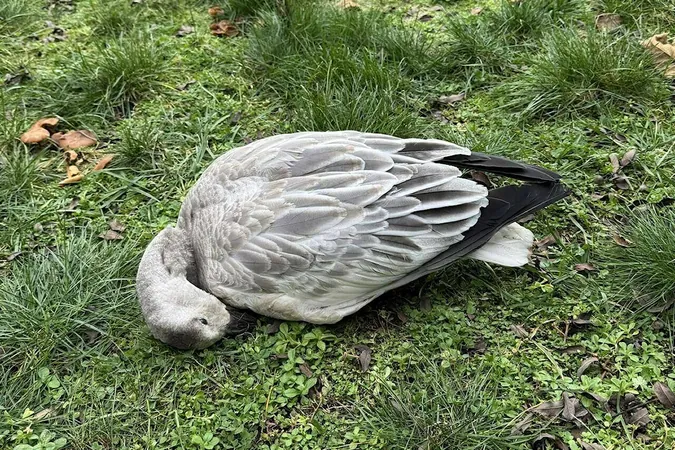
Is Avian Flu on the Rise in Canada? Shocking Case Raises Alarms!
2024-11-13
Author: Olivia
Introduction
In a chilling Halloween encounter, a resident from Richmond, British Columbia, experienced a disturbing incident when a snow goose landed in her backyard. Initially, Carolyn Law thought little of the bird's presence. However, mere hours later, the goose displayed alarming symptoms, continuously bobbing its head before convulsing and ultimately dying.
"It was quite a sad thing to see, actually — really frightening," Law recounted. After witnessing the bird's unusual behavior, she contacted a wildlife rescue group. The organization informed her that symptoms pointed toward avian flu rather than a physical injury, though confirmation could only come through testing.
Rising Concerns
This incident has garnered heightened attention following reports of a teenager from B.C. who has tested positive for the H5N1 strain of the avian influenza, marking Canada's first presumptive human case. The young patient is currently in critical condition, and despite extensive investigations, officials are uncertain about the route of infection.
Dr. Bonnie Henry, B.C.’s Provincial Health Officer, emphasized the importance of caution during a recent news conference. Although the risk of human infection from H5N1 remains low, her statements reflected a growing concern about public health safety.
Health Measures and Recommendations
Health Canada echoed these sentiments, urging people to steer clear of sick or dead birds and ensuring that those who work with animals take necessary precautions, including wearing protective gear. The health department has reported an alarming spike in avian flu infections among commercial poultry flocks in British Columbia, with over 20 cases noted in recent weeks, likely attributed to migratory birds headed south for the winter.
Infectious disease expert Brian Ward from McGill University commented on Law’s goose incident, highlighting that while no conclusions could be drawn without proper testing, the alarming rise in dead wild birds could indicate a broader influence of the highly pathogenic avian influenza.
Ward further described the unexpected positive case in the teenager as an almost inevitable outcome given the increasing prevalence of the strain across North America and Europe. In the U.S., the Centers for Disease Control has recorded 46 human cases of avian flu, yet human-to-human transmission remains unverified.
Public Assurance and Vigilance
Despite these worrisome developments, Health Canada reassured the public that the risk of widespread infection is low, elaborating that thorough cooking of poultry and eggs renders them safe for consumption. The last recorded case of human avian influenza in Canada was in Alberta in 2014, tied to travel in China.
However, as Dr. Henry noted, the risk posed by wild birds cannot be dismissed. Public health officials are urging individuals to avoid direct contact with sick or dead birds and to keep pets away from such hazards. Fears of residual or airborne infection are significant, with the risk of inhalation posing a genuine threat.
Emerging Instances
As more instances of avian influenza emerge, including a recent case in Ontario where a dog became infected after biting a dead bird, the call for vigilance becomes increasingly urgent. Authorities recommend reporting any sightings of sick or dead birds to the appropriate wildlife offices.
Residents are encouraged to remain alert for flu-like symptoms following any exposure to sick animals, reminding people that early reporting can be crucial in guiding healthcare providers for testing and treatment.
Conclusion
Law expressed her primary concern for her dog, which had gotten dangerously close to the dying bird. The situation escalated quickly, prompting her husband to take precautions that included wearing gloves and a mask before disposing of the dead goose safely.
As discussions about avian flu gain momentum, experts emphasize the importance of public awareness and preparedness. Will the growing threat of avian influenza lead to stricter regulations and enhanced safety protocols? The answer might depend on how vigilant the community becomes in the face of this potential health crisis. Stay informed and protect yourself and your loved ones!









 Brasil (PT)
Brasil (PT)
 Canada (EN)
Canada (EN)
 Chile (ES)
Chile (ES)
 España (ES)
España (ES)
 France (FR)
France (FR)
 Hong Kong (EN)
Hong Kong (EN)
 Italia (IT)
Italia (IT)
 日本 (JA)
日本 (JA)
 Magyarország (HU)
Magyarország (HU)
 Norge (NO)
Norge (NO)
 Polska (PL)
Polska (PL)
 Schweiz (DE)
Schweiz (DE)
 Singapore (EN)
Singapore (EN)
 Sverige (SV)
Sverige (SV)
 Suomi (FI)
Suomi (FI)
 Türkiye (TR)
Türkiye (TR)